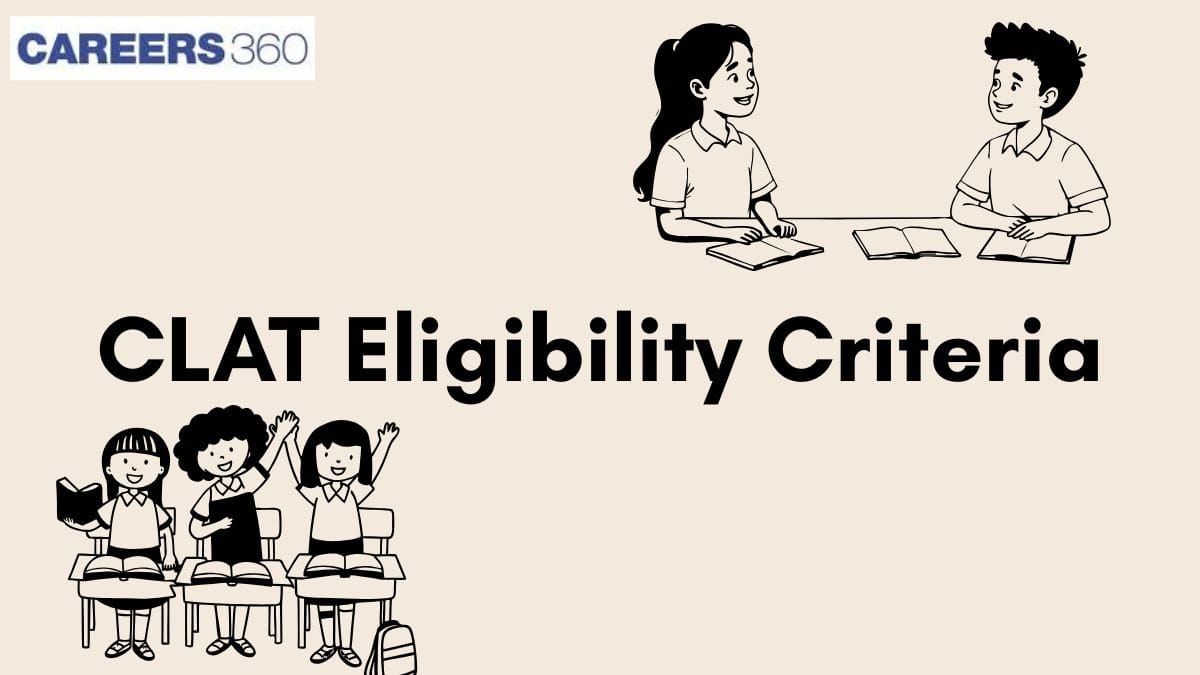UPES Integrated LLB Admissions 2025
Ranked #28 amongst Institutions in India by NIRF | Ranked #1 in India for Academic Reputation by QS Rankings | 16.6 LPA Highest CTC | Last Date to Apply: 31st August | Admissions Closing Soon
The Consortium of NLUs has prescribed the CLAT 2026 eligibility criteria for UG and PG programs on the CLAT 2026 official website. The CLAT eligibility criteria 2026 include requirements about the educational qualification, minimum passing marks, and age limit. As per the eligibility criteria of CLAT 2026, candidates who have completed class 12th or are appearing for the class 12 exams in March/April 2026 are also eligible to apply for CLAT UG 2026. Candidates who have completed their law graduation or will appear in their qualifying exam in March/April 2026 will be eligible to apply for CLAT PG. The Consortium will conduct the CLAT 2026 on December 7, 2025 in offline mode.

The Common Law Admission Test is held for admission to 26 participating National Law Universities and other colleges that accept CLAT scores for admissions into their UG and PG programmes.
| Criteria | Eligibility |
|---|---|
Educational Qualifications |
|
Minimum marks required in qualifying exam |
|
CLAT exam Age Limit |
|
Also check - CLAT Exam Date
Criteria | Eligibility |
|---|---|
Educational Qualifications |
|
Minimum marks in the qualifying exam |
|
Age Limit |
|
The Consortium of NLUs releases detailed information regarding CLAT UG 2026 eligibility criteria through its official website. Before applying for the entrance exam, candidates must carefully check the specified eligibility for CLAT UG in detail. If candidates are found to be ineligible for CLAT 2026 at any stage of the admission process, they will be disqualified from the process. The detailed CLAT UG eligibility conditions have been given below:
The Consortium of NLUs does not specify CLAT eligibility age. Candidates of all age groups can apply and appear for the CLAT 2026.
The Consortium of NLUs prescribes the CLAT PG eligibility separately on its website. Candidates who are planning to appear for CLAT PG must carefully go through the CLAT LLM eligibility criteria 2026. The detailed eligibility criteria of CLAT LLM 2026 have been given below:
Ranked #28 amongst Institutions in India by NIRF | Ranked #1 in India for Academic Reputation by QS Rankings | 16.6 LPA Highest CTC | Last Date to Apply: 31st August | Admissions Closing Soon
Ranked 1 st among Top Law Schools of super Excellence in India - GHRDC | NAAC A+ Accredited | #36 by NIRF
Also check - CLAT Previous Year Question Papers
The Consortium of NLUs has not specified any upper age limit for appearing in the CLAT 2026 exam. Candidates of all age groups can appear for the CLAT PG exam 2026.
Candidates should fulfil the following NLU admission criteria to be considered for admission:
Candidates must have appeared in the CLAT 2026 entrance examination and obtained a valid score to be eligible for admission.
Each NLU has a different policy for CLAT 2026 reservation criteria. Candidates seeking admission under the domicile category must ensure they fulfill the eligibility under CLAT reservation for that particular NLU.
The allotment list is provisional, and candidates must get their documents verified and complete the prescribed fee payment to be eligible for admission.
You may also check -
The CLAT 2026 eligibility criteria for NRI students require aspiring NRI/NRI-sponsored candidates to appear for the CLAT exam and obtain a valid score. Such candidates must then apply separately to the NLU where they wish to seek admission. The candidates must ensure they fulfill the NRI/NRI sponsored status laid down in the CLAT 2026 reservation criteria before applying.
NRI candidates must submit the following documents when applying to the desired NLU.
The Consortium of NLUs released the CLAT 2026 application form on August 1, 2025. Interested candidates can fill out the application form for CLAT 2026 from the official website of the exam - consortiumofnlus.ac.in. Only those candidates who fill out their CLAT 2026 application form before October 31, 2025 will be allowed to appear for the exam.
You may also check popular Law courses-
There is no age limit to appear in the CLAT 2026 entrance examination.
CLAT UG aspirants must have completed their class 12, whereas CLAT PG aspirants must have completed their 5-year LLB or 3-year LLB degree.
Yes, candidates in their class 12 are also eligible to appear for CLAT 2026.
There is no limit to the number of attempts in CLAT examination.
Yes, the School of Excellence in Law (SOEL) accepts CLAT scores for admissions, and there are cutoffs for different categories. SOEL, part of TNDALU, offers BA LLB (Hons), BBA LLB (Hons), and BCA LLB (Hons) programs. The cutoffs vary based on the category and program.
For the OC category, the cutoff for BA LLB/BBA LLB was 97.750, and for BCA LLB, it was 96.5.
The cutoff can fluctuate based on the number of applicants, the difficulty of the exam, and the number of seats available
Hello
Yes, scholarships are available for CLAT merit holders. Many law schools, including some top institutions, offer financial assistance based on CLAT scores. For example, National Law Universities (NLUs) often offer merit-cum-means scholarships to students who excel in the exam. Additionally, some private organizations and law firms also offer scholarships to top CLAT scorers. The amount and criteria for these scholarships vary, but they usually cover tuition fees or provide financial support for study materials and other expenses.
Currently, CLAT is conducted in various cities across India, but as of now, there are no official test centers outside India, including in the UAE. Students residing abroad typically need to travel to India to appear for the exam. However, rules and centers may change in future, so I suggest keeping an eye on the official CLAT Consortium website, especially when the 2026 notification is released. If traveling to India is challenging, you can plan your trip in advance around the exam date. Also, for NRI or NRI-sponsored seats in Indian law colleges, some universities may have a different selection process that doesn’t require CLAT, so you can explore those options too.
Thank you,
Hello aspirant,
There are various online platforms, offering previous year's question papers of CLAT PG exam. One of which is careers360, the link of which I am attaching here,
https://law.careers360.com/articles/clat-pg-previous-year-question-paper
By solving previous year's papers, you will have a better understanding of exam pattern and confidence to write paper.
Best of luck for your preparation.
A lawyer advises clients on legal matters, represents them in court, and drafts legal documents. They work in various fields like criminal, corporate, or family law. Key skills include communication, research, and analytical thinking. To become a lawyer in India, one must complete a law degree, clear entrance exams, register with the Bar Council, and pass the All India Bar Examination.
A civil lawyer handles non-criminal legal disputes like family, property, and contract issues. They represent clients in court, draft documents, and advise on legal rights. To practice in India, one needs an LLB degree and Bar Council enrollment. Civil lawyers work in firms, government, or independently, with growing demand across various specialisations.
Individuals in the human rights lawyer career path are legal professionals responsible for advocating for people whose inherent dignity has been violated and who have suffered a lot of injustice. They take cases to defend the human rights of minorities, vulnerable populations, the LGBTQI community, indigenous people and others.
A criminal lawyer defends individuals or organisations accused of crimes, ensuring fair trial and legal rights. They analyse cases, represent clients in court, conduct legal research, and negotiate plea deals. Strong communication, analytical, and ethical skills are essential. After earning a law degree, gaining experience, and registering with a Bar Council, they can practise independently or with law firms.
Family lawyers are required to assist a client in resolving any family-related problem. In general, family lawyers operate as mediators between family members when conflicts arise. Individuals who opt for a career as Family Lawyer is charged with drafting prenuptial agreements to protect someone's financial interests prior to marriage, consulting on grounds for impeachment or civil union separation, and drafting separation agreements.
A cyber lawyer handles legal issues related to the internet, such as cybercrimes, data breaches, and online privacy. They prepare legal documents, represent clients in court, and advise businesses on cybersecurity compliance. The career requires a law degree, specialisation in cyber law, and strong tech knowledge.
An immigration lawyer is responsible for representing the individuals (clients) involved in the immigration process that includes legal, and illegal citizens and refugees who want to reside in the country, start a business or get employment.
A Government Lawyer represents the government in legal matters, provides legal advice to officials, drafts legislation, and prosecutes or defends cases. The role requires strong research, communication, and analytical skills. To pursue this career, one must obtain an LLB, pass the Bar Exam, gain court experience, and apply for government positions. Career progression includes roles from junior to senior government lawyer.

700+ Campus placements at top national and global law firms, corporates and judiciaries

18 years of shaping legal professionals | In-house judicial coaching | Proven success in National Moot Court Competitions
NAAC A+ Grade | Among top 100 universities of India (NIRF 2024) | 40 crore+ scholarships distributed
North India's Largest Educational Group | NIRF Ranked 86 | NAAC A+ Grade | Highest Package 1.6 Cr | Last date: 31st Aug'25
Ranked #28 amongst Institutions in India by NIRF | Ranked #1 in India for Academic Reputation by QS Rankings | 16.6 LPA Highest CTC | Last Date to Apply: 31st August | Admissions Closing Soon
Admissions open for B.A. LL.B. (Hons.), B.B.A. LL.B. (Hons.) and LL.B Program (3 Years)